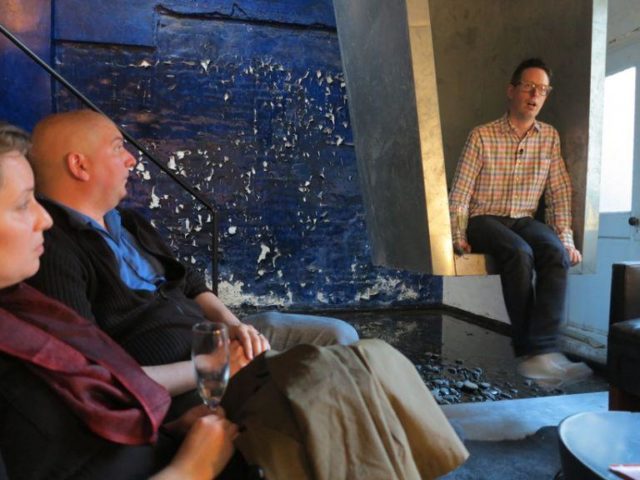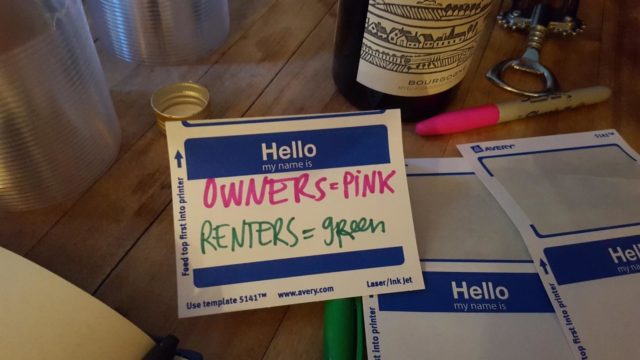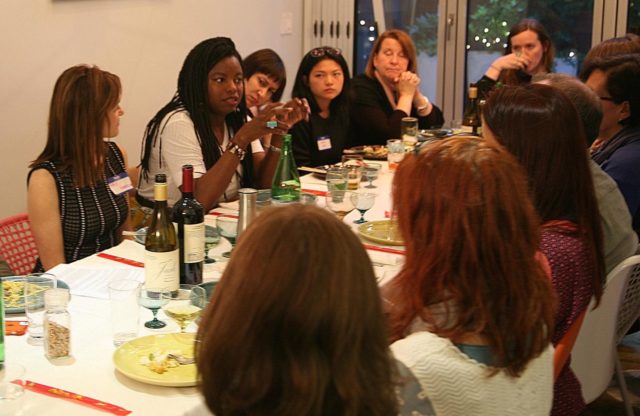
MONTH2MONTH. Featuring the Live/Work space of David Ling Architect in Gramercy Park. Image courtesy MoreArt.
“How can you say that affordable housing should go towards artist studios rather than homeless domestic violence victims?”
The question, asked on Monday evening by the Village Voice’s Neil deMause during dinner at a luxurious Chelsea apartment, sent some hands reaching for wine glasses. It was a moment in William Powhida and Jennifer Dalton’s MONTH2MONTH, the public art project running in private residences around the city throughout May, that made the stakes of such a project’s engagement housing uncomfortably clear. The guests at the dinner, a varied mix of artists, patrons and the curious, were faced with a paradox of the liberal sensibility whereby supporting the arts might be tantamount to taking housing away from the truly needy. At least until Powhida announced that he, an artist, didn’t think artists should be given studio space over anyone.The problem is one of affordability. The discussion moved on, drinks were refilled.
In the age of poor doors and museum-sanctioned real estate summits, MONTH2MONTH, produced by MoreArt, asks what role the art community, which is so often viewed as an agent of gentrification, can play in the debate around NYC housing. The month-long series of public events has provided a platform for discussions amongst a variety of art and non-art participants about how class, wealth, and social mobility affect living conditions in the city.
The project primarily takes place in two apartments, a “luxury” Gramercy apartment and an “affordable” one-bedroom in Bushwick (Powhida’s own) each of which have been given over to winners of an apartment-stay lottery held earlier in the year. Roughly sixty people applied for eight spots and applicants were faced with an invasive process mimicking that of the New York City Housing Authority’s application for public housing. These guest residents have been interviewing and recording their experiences with the project and their own housing history. The material will be presented in a publication following the public portion of the project.
For now, though, the apartment-stay participants have taken a backseat to the large variety of events involving housing rights advocates, financial journalists, developers, doormen, artists, activists and other such voices and stakeholders in the present and future of housing. The result of these events, as I experienced it, was that engagement never with the depth of contributors went much beyond dinner conversation-level ideas. The discussions rarely had a conclusion and were almost entirely shaped by the participants, not just invited the speakers but the assortment of attendees.
All this is fine, though, because as a collection of experiences and opinions they ultimately unsettled typical class divisions of housing. The context, shifting between “luxury” and “affordable” apartments, both disrupted and informed conversation, often adding a level of unease to even the most basic conversation in such intimate domestic settings.
What follows below is a recap of the three events I attended, “Of Bubbles and Bubbles,” “Is Private Property OK?”, and “A Dinner with Housing Policy Experts,” along with a few observations about how class, wealth and social mobility were challenged.

“Of Bubbles and Bubbles” with Felix Salmon in Gramercy Park – space courtesy of David Ling Architect. Image courtesy MoreArt.
OF BUBBLES AND BUBBLES
“Of Bubbles and Bubbles” was a wine tasting and interactive discussion about bubbles of various kinds —champagne, art, and housing — led by economics writer Felix Salmon. The event took place in the Gramercy luxury apartment, with the vital stats of the apartment and neighborhood (number of bedrooms, amenities, valuation, median income, etc) provided on a fact sheet like one that might be presented at a broker’s open house. Salmon used the sparkling wine tasting to open discussion about the arbitrary yet often perceived correlation between price and quality. As Salmon said, you are more often than not paying for the brand, so instead he suggested “dipping your ladle” into the lake of cheap wine, avoiding the bubble by finding something cheap that you like to drink.
“There is a [contemporary] art lake as well,” Powhida said, and certainly the parallels between art and wine seem obvious. Just like champagne the first thing many collectors do is buy the artist as a brand rather than any purely aesthetic experience or enjoyment. The discussion pulled back towards real estate and the New York FOMO bubble (the fear that if one does not buy now, one will never again have the opportunity to own property in the city), with the acknowledgement that we live in a culture that values personal space and ownership. People here typically don’t pay to live communally, Salmon said, despite how well it works in other parts of the world. But his audience didn’t accept that, particularly given the prevalence of shared living and working spaces in New York, and wanted to imagine what other modes of living might look like – private, co-op, or otherwise. This moment at the tail end of Salmon’s talk revealed how even a crowd at a champagne tasting can begin to have conversations about what a different housing narrative might be, mobilized or spurred on by the seemingly symbolic space of an art project like MONTH2MONTH.

Nametags for “Is Private Property OK?” Image courtesy of the author.
IS PRIVATE PROPERTY OK?
Changing the location to the “affordable” apartment for the discussion “Is Private Property OK?” attendees were asked to self-identify as either renters or owners by colour on their nametag. Participants sat around a table for a conversation led by Powhida and Dalton. The division emerged from the artist’s own experiences, with Powhida expressing renter’s-shame for not owning property like an “adult”, while Dalton questioned why as an owner she deserved to be worth more than most people.
The ensuing conversation showed how much the audience of such an event defines its limits. From the beginning, no one challenged the belief that private ownership is, in fact, “OK”. The discussion became a banal “guide to being an owner,” as the owners at the table explained the mechanisms of property ownership to the renters. An utterly drawn-out explanation of co-ops drained the potential revolutionary energy in the room. As a co-living foreign student renter, my own jaw gaped as one owner described the horror of how the ever-increasing values of her Greenwich Village home would force her out of her own neighborhood (if she decided to cash out and make millions of dollars on the property). Certainly each community in the city faces its own pressures, and around the polite dinner table even the problems facing multi-million dollar property owners can seem more urgent than they are legitimate, but such discussions cannot lead to solutions for those truly in need. It was only with the consensus that wealth concentration has led to a lack of freedom (of movement and housing choice) for renters and low-income owners alike that the conversation eventually became productive towards the project’s goals.

“Dinner with Housing Policy Experts” including special guests: Neil deMause from the Village Voice, Adeola Enigbokan, artist and housing activist, and Heidi Schmidt, director of Government Relation, Dept. Homeless Services. Image courtesy MoreArt.
A DINNER WITH HOUSING POLICY EXPERTS
At the next evening’s “A Dinner with Housing Policy Experts,” Adeola Enigbokan, artist and housing activist, noted early on that political rights in the U.S. have historically been tied to property ownership. This included slavery, making explicit how the condition of property ownership and privacy of the individual body come into conflict. Hosted in a luxury Chelsea apartment under the guiding demands of the Brooklyn Anti-Gentrification Network, Enigbokan reflected on the uniqueness of New York as a renter’s city. Renters’ rights, however, after being worked up over decades, are now being eroded by the financialization of housing and broader attacks on workers’ rights and welfare. So while AirBnB could be a lifesaver for those needing extra income, Enigbokan could not let us ignore that AirBnB and companies like it are also taking advantage of those hard-fought renters’ laws and giving money back to venture capitalists. Meanwhile apartments become stock for tourists drawn to New York, as Enigbokan reminded us, by a continuation of Bloomberg’s campaign to make the city a luxury brand destination.
Most foreboding is what New York will do to maintain its veneer. Heidi Schmidt of the Department of Homeless Services noted that NYC is one of the few cities in America with the right to shelter, but New York will buy the homeless bus tickets to family in distant states to keep them off the streets. The creation of affordable housing is not meant to keep the homeless off the streets, many of whom are there to escape domestic violence. Hence when deMause asked how we can make housing allocation decisions, Enigbokan demanded we stop addressing the question financial terms; housing development should be about the meeting needs of society, not the financial needs of investors and developers. Was that even possible? Dalton noted that we seem to have accepted that people have the right to profit not to shelter. That sentiment rang true for many of us in the room, but B hope was offered. “We’re having this conversation in a luxury apartment for a reason,” Powhida said, challenging the assumption of profit above all else. “Developers have wants, not needs.”
MONTH2MONTH has more to come in the final week of the month; “A Dinner with Doormen” (Monday, May 23) looks to be particularly juicy while “Rant Night” (Tuesday, May 31) will likely bring the project’s discord of voices to a boiling finale. RSVP while you still can.


Comments on this entry are closed.